Do you want to understand the working of keywords in SEO? Are you interested in bringing up your website but need a guide for your keywords?
Keyword research is undoubtedly the most influential aspect of content and website; SEO is incomplete without keywords. To get started on any website, you must have a good idea of keywords.

Keyword research is without a doubt the foundation of SEO, you will find hundreds of posts on how you can do keyword research, but, you know reading through tons of words will not help, this is where we understand our users. We have made it super easy for you using our ultimate guide.
Keywords are a straightforward concept, and on our site, we will simplify it even more for our users. Before you start your website, we recommend you go through our Keyword research guide so that you can build a healthy website.
What Is Keyword Research?
Keywords are highly regarded as an essential part of SEO. The whole foundation of SEO is said to be based on keywords.
Keywords are nothing but phrases or words we enter on search engines to get results. You could refer to keywords as ‘search terms’. For example, your search ‘How to become rich’ on Google; then becomes your keyword.
You get results in millions for any keyword search. As in our example, you can see that Google has displayed 1,40,00,00,000 results in just 0.55 seconds.
If you look at the history of keyword research, back in 2000, it was all about going to Google’s keyword finder and finding the keyword and then stuffing it entirely on your website. A lot of the sites misused this, which is why Google made several updates to their algorithms.
These algorithms can be considered a changing face to the keyword stuffing consequence. These updates vanished a lot of websites and gave a more sensible approach to keyword research. The updates mainly focused on user wants and helped websites fulfill user needs.
Why Is Keyword Research Necessary?
Keyword research is essential when it comes to SEO; keywords are what drive traffic to your site. By using the right keywords, you can not only improvise your content but also grow your website.
A lot of users have a different approach to anything they are searching, for instance, if you want to know ‘Which is the best car for you?’, you might end up searching ‘Best Car offers’, ‘Best cars within $50,000’ or you may also search ‘Top fuel saver cars’.
There could be a lot of approaches to a particular search. A keyword research tool helps you find what’s suitable and profitable for you.
Keyword research helps you find out what your potential audience is looking for and help them provide them with the same benefits as you as well as you.
Essential Concepts Of Keyword Research:
There are a lot of crucial concepts you must know before you go into a deeper understanding of Keyword research, the main concepts being types of keyword research.

Types of Keywords –
We have shortlisted a few types of keywords to give you a basic understanding of what kind of keywords are present currently in the industry, along with what are the best keywords for you.
- Long-tail keyword
Long-tail keywords are three to four-word phrases that users use while searching on search engines. These are used more by users compared to the short-tail keywords.
- Short-tail keyword
Short tail keywords are words used to search on a search engine with one one-two word; these describe the entire content a user is looking for.
- Organic Keywords
These are the keywords that generate free traffic for you; they will help your content list better organically. You can get more of these keywords with an SEO tool. These are related terms to the keyword that do not usually include the keyword in them.
- LSI keyword
The full form of LSI is latent semantic indexing; these are nothing but keywords widely similar to your main keyword. For example, your keyword is Car; the LSI keywords would be Manual Car, Black Car, Car Wash, Car Park, and much more.
- Short-term fresh keyword
The short-term fresh keywords are fresh keywords; in a sense, they are a recent trend and will be ranking highly for a shorter period. The best example I could use for short-term fresh keywords is movie names; when you write reviews, the keywords you use will be ranking highly for a shorter period based on your movie’s hype.
- Long-term evergreen keyword
These are the keywords that are consistently trending for a more extended period, there might be ups and downs in their rankings, but the fluctuations are not much.
These keywords help you in the long run if in case you want to publish something and don’t want to change the content, then it becomes much more comfortable and beneficial to use these keywords.
- Product defining keyword
These are keywords that help you in defining your product; these are usually added to your product name so that when users search for keywords, it becomes easier to link them to your product. For example, if you are selling a mountain bike of the Sona brand; you can define your product as a Sona Mountain Bike for heavy-duty trails.
- Customer defining keyword
These are the keywords that are specifically related to the target audience; this gives more explanation about whom the particular keyword suits and more. For example, your keyword could be ‘Best SEO tool’, you can make this a customer-defining keyword by changing it to Best SEO tool for Beginners, this specifies that your tool is looking for a target audience who are in their beginner stage.
- Geo-targeting keyword
Geo-targeting keywords are nothing but location-specific keywords; they give more clarity on the geographical potential of the keyword and help search accordingly. These keywords are highly used by local businesses; the best example could be a local restaurant in Chicago that could add the keyword ‘Best Mexican Shawarma in Chicago’. This helps not only the user of the keyword but also the audience to get location-based results.
Which Are The Most Profitable Keywords?
The most profitable keywords for anyone would no doubt be Long-tail keywords; these benefit the users for a more extended period as they keep generating traffic to the site. They usually stand in trend for longer than other keywords, and this benefits you as you don’t have to keep updating your keywords now and then. Though they do go up and down now and then, the fluctuations aren’t very high. These are highly recommended for use.
Metrics To Look While Choosing a Keyword:
Before choosing a keyword, there are a few factors you must keep in mind. We will walk you through the essential aspects you will have to keep in mind before you get started with keyword research.
- Search Volume
Search volume is a pretty straightforward thing; you can quite easily find out how many searches you will probably get for a particular keyword. However, it again depends on the niche your keyword represents; you can get a higher search volume for a fitness-related keyword in for a fitness niche over a sports niche.
- Organic Click-Through-Rate
An organic click-through rate is nothing but a determination of how many potential clicks your keyword will get naturally. Usually, search volume is not sufficient to determine the traffic; you need to keep in mind the organic click-through rate as well. You can use SEO tools to checkout CTR.
- Difficulty
Keyword difficulty is nothing but how difficult it would be for a particular keyword to rank on your website. They show you the more suitable keywords; these usually work for organic keywords.
- CPC
A lot of the keywords will give you great earnings with Cost per Click(CPC) Ads. These CPC Ads show you how much you can earn for a particular ad that is related to your keyword. This indicates that though your keyword might be ranking low, it could give you a high return.
- Keyword Trends
You must know if the particular keyword you are using is in trend or not; the best way to do this would be by checking google trends. You will get an idea of how trendy your keyword is and whether you must consider it or not.
Best Keyword Research Guide in 2025 for SEO:
Doing keyword research is very simple, even for beginners. If you are among those who think it is difficult, do not worry. We have got your backs. On our website, we will walk you through a step-by-step process on how to do keyword research for SEO as well as your website.
For the best user understanding, we have simplified the process and sorted them into easy steps. Follow our steps to get started with Keyword Research for SEO.
Step 1: List down Important and Influential topics
To get started, you will have to create a list of important and influential topics concerning your content. You can use seed keywords for this purpose.
All you have to do is, think from the audience’s point of view, what would they expect from your content, what keywords would they type to find your content, and such things.
For example, if your content is based on Motorcycles, you could use subheadings or topics such as Mileage, Horsepower, RIde-Modes, Torque, ABS, and much more.
Step 2: Keyword filling
Now that you know the essential topics, you will have to fill the topics with keywords. These are the keyword phrases that will help you rank better with SERPs.
You need to choose keywords, based on your targeted audience smartly. You can refer to the previous subheading to know more about how you can effectively select a keyword.
You need to search for keywords or terms that are related to your post; this will help you. Random filling of keywords would not do any benefit.
Step 3- Research the Search related terms
You need to know well about the search-related terms before you publish your content. The easiest way to get search-related terms is to type them out on Google.
For example, your seed keyword is ‘Photoshop. ‘
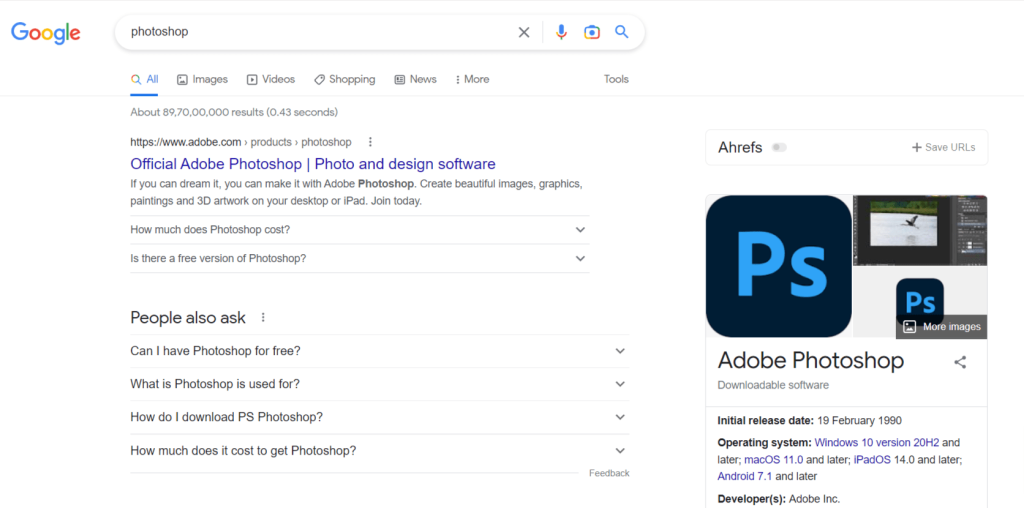
Scroll down to the end of the page, and you will get the searches related to Photoshop. You could always use these as they are related to your keyword and will attract more traffic.

These keywords will give you the best results; you could use these in your heading tags as well.
Step 4: Promote Long tail keywords or a mix of head terms
Using the most commonly used keywords will not give you higher rankings as they are highly competitive. Instead of using these, you could use Long tail keywords and a mix of head terms. For those of you who are not familiar with head terms, I will walk you through it.
Head terms are the precise keyword that you use when you use this particular keyword; you will have a lot of competition along with a high ranking of the keyword. What alternative you can go for is, to make a mix of the head terms.
When you mix your head terms with long-tail keywords, you get a good result in the longer run. This will highly benefit you as you are not using the exact keyword; you will have lesser competition but great site rankings.
For example, you want some ‘backlinks’. So there are three possible searches now that a regular user would usually type.
- Backlinks
- How to find backlinks
- Best backlink tool
A lazy user might simply go to type backlinks; let’s see the results.
You can see, with this keyword, you get suggestions that inform you more about what backlinks are and how they function and not precisely a backlink tool.
Let’s try the second search now.
Now you can see, there are exact tool suggestions. The first ranking is Moz and the second is Ahrefs, both are great tools. You will now be able to check out the precise tool by going to their website and then will be able to find backlinks.
Let’s try our last search.
When you look for the best backlink tool, you will get blogging websites that will suggest you the best backlink tools rather than the actual tool.
These 3 are the best examples for you to understand why you should not use a keyword entirely rather than that, you must look to use a long tail and a mix of head terms also.
By using these, you are cutting down your profits as well as increasing your potential traffic.
Step 5: Shortlist your keywords
A lot of us might use long-tail keywords assuming they are profitable and add them; sadly, this is not how it works in SEO. You need to consider a few factors before you apply a keyword.
The mentioned factors are search volume, CPC, Difficulty, Trends, and much more. The reason you must consider these is that not all long-tail keywords are beneficial. You must ensure that you choose a keyword that fulfills these factors.
You must also ensure you analyze your tools well before you shortlist them. Analyzing your keywords is quite simple; you just have to keep three things in mind.
1. The popularity of the keyword
Popularity refers to nothing but the search volume. This is favorably mentioned over and over to you again; if you do not analyze the importance of your keywords, you will not be able to reach anywhere.
You can use tools for keyword research as well; you can use google as well as SEO tools. However, different tools will have different results as procedures.
Along with popularity and search volume, you should check the long-term performance of the tool, to prevent this, the best free tool would be Google trends.
Not only can you find their trends but also know about the seasonality of your keywords, this is nothing but during which time would your keywords rank higher. For instance, the keyword ice cream would rank higher during summer than in winter.
2. Keyword difficulty
Keyword difficulty is nothing but a metric that lets you know how difficult it would be for a particular keyword of yours to rank. The higher its difficulty, the least preferred it must be for your website.
If you do not consider this metric and add keywords that do not suit your niche, then your website will find it challenging to rank anywhere near the top.
When you are considering the keyword difficulty metric, you must consider the following
- It is not an exact result
You must know that the keyword difficulty metric is not an exact result; the estimated data could be different from the actual result. Therefore you should not wholly consider it to be true without testing the keyword.
- Don’t compare keyword difficulty.
Different tools use different algorithms and methodologies. Therefore you should never compare various tools. Instead, you can just test a few keywords.
- Keep in mind the subjective factors.
You cannot wholly rely on keyword difficulty metrics; there are a lot of other factors such as the quality of your content, your SEO skills, your Ads, and much more that will nourish your site’s overall growth.
Step 6: Use keyword research tools
You can also use tools from the internet to get keyword suggestions; you will have a lot of tools at your hand available for free that will help you with keyword research.
You can check premium tools on the internet; there are tools like Ahrefs, SEMrush, and Moz that give great keyword research features.
However, these are premium and luxurious; for beginners, the best tool would be Neil Patel’s Ubersuggest. This is one of the best free tools in the market and is highly recommended to beginners for keyword research.
These tools simplify the whole keyword research process for you; you don’t have to sit for hours and research individually if you have these tools.
How To Find Keywords For Your Website?
Now that you know about keyword research and keyword ranking, you must understand about improvising content for your website as well. Follow our simple steps to get started.
Step 1: Know the essential factors before choosing keywords
You must consider a few crucial things before you start selecting keywords for your website, they are
- Relevance
Search engines rank content based on relevance; this is why it is crucial to know the relevance of whatever keywords you include in your website.
- Authority
You should make sure that you are considered authoritative by search engines. Your content should be so good that SERPs will automatically give you higher rankings.
- Volume
Choose a keyword that gives you a significant volume of searches, you may rank on the first page, but that does not mean that you will have traffic at your site. You must ensure that you have keywords that attract traffic in greater volume.
Step 2: Mix head terms and long-tail keywords
You must ensure that you not only fill in keywords but also have a mix of head terms and long-tail keywords. This ensures that you get enough traffic on your content.
The need for long-tail keywords and a mix of head terms is crucial as it is responsive to specific user searches. Users don’t usually go to search content based on a single keyword, they do particular searching, and we must predict the particular search and create our content accordingly.
Step 3: Analyze competitor rankings
You need to ensure that you do thorough research on your competitor rankings, this is important because you can get insights into what type of keywords they are using and what is helping them in ranking better.
If your competitor is analyzing for a particular keyword, then you can check it and try improvising on it by mixing the head terms.
You can use an SEO tool to check the rankings as well; these are important because they save time. You can easily find out what keywords your competitors are ranking and adapt similarly. You can do this with the help of free SEO tools as well.
Step 4: Cut short your list of keywords to select the most appropriate
Once you have got a list of your keywords, you must narrow down the list. This is needed because all the keywords you choose might not be relevant to your content.
To find out which keyword will better suit you, you must first get an SEO tool. An SEO tool helps you find keyword-related metrics such as volume, rankings, etc. that will give your site better health and position.
Our most recommended free tools are Keyword planner, google trends, and Ubersuggest for all your keyword research needs.
Tips for Keyword Research:
1. Keyword Prioritization
You must know how many keywords you want on your website. You can keep a particular limit of how many keywords would help your site rank better. For a small-scale business, you can have hundreds of keywords.
2. Focus on Synonyms
Search engines these days are brilliant, they usually track all the websites and give the users results that best suit them. They track results and position sites accordingly.
What you can do is you can use synonyms, these synonyms give a better understanding of your text and clarify its readability. These help your sites rank better as well.
3. Singular and Plural keywords
You must check out how your keyword ranks for singular and plural keywords. Singular and Plural keywords both tend to have different meanings for a word. For instance, let us take the keywords Book and Books.
When you type Book, the result you get is restricted to the definition of a book. When you type the keyword books, the result you get is of a nearby bookstore or some top picks from Amazon which indicates that the search engine presumes you want to purchase a book.
This is why you must always ensure that you use singular or plural keywords based on how the search engine will display results.
4. Do not overuse the same keywords
While writing your content, you must ensure that you are not overusing the same keywords again and again. Search engines like Google rank posts or pages that are similar very low.
Therefore you must ensure that you go for various keywords, this will help you rank better.
5. Find Keywords on Reddit, Google and Youtube suggest
You can find keywords on Reddit as they have a great audience. Other great platform is google, and youtube suggests as they also have great keyword results.
6. Find Popular Topics Using Forums
You can find popular topics using SEO tools; these help you with the best keywords as well as let you analyze your competitors.
You will get thousands of keywords in just one click, that’s how simple these tools make it for you. There are a lot of premium tools such as SEMrush and Ahrefs, but their pricing is quite luxurious. You can check out free tools like Ubersuggest which give you keywords at no cost.
Best Keyword Research Tools (PAID):
There are a lot of keyword tools that you can access, but for our users, we will suggest the best and most elite tools for their happiness.
1. Semrush
SEMrush is on top of our list for keywords; this is because it has been on top of the market for quite a long time. It offers you a great tool that only gives a great keyword research tool but also gives a lot of other features that will promote the overall growth of your website.
Semrush Keyword tool will give you great results in seconds; you can hunt thousands of keywords and get all the related metrics with the help of their tool. SEMrush has a unique tool when it comes to keyword research; this is the geolocation tool.

The geolocation tool hunts keywords based on locality; you can find keywords that are more suitable and apt to your location and area.
Their pricing is, however, a little elite, their plans start at about $99.95 per month. You can also use Semrush for free.
2. Ahrefs
SEMrushs most significant competitor and one of the best Keyword research tools, Ahrefs has quite been a great keyword explorer in the industry.
It has a keyword explorer that lets you smoothly explore for keywords; you can even find out your keyword rankings based on clicks; this way, you can wisely choose which keywords based on their click volume.
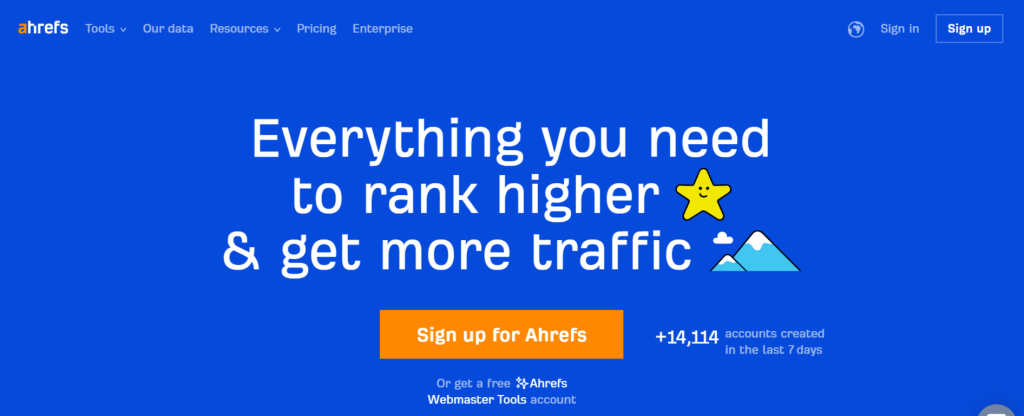
They also have an organic keyword tool; this tool lets you rank your organic keywords as well as gives you a detailed organic keyword report.
Their pricing is also entirely rational; their plans are similar to that of SEMrush and start at $ 100 per month.
3. Moz
Moz is third on our list for keyword research, and Moz is another elite app that gives you keyword research quickly. They do not have a vast keyword database such as SEMrush. However, the standout feature of SEMrush is its Priority score.
The priority score is a unique feature; unlike SEMrush and Ahrefs, this priority score follows a different algorithm. As the name suggests, it lets you know how much you must prioritize a particular keyword.

The factors considered for scoring by this tool are the traffic generated by this keyword, its related organic keywords, and the keyword’s difficulty.
As you know it’s an elite app, its pricing is extensively high as well. It starts at $ 99.
These are the three premium SEO tools for keyword research; these would undoubtedly be the top 3 of any SEO expert. Their prices are high, but if you want to be the market leader, these premium tools are a must.
A lot of the users would not want to spend or have a budget for a premium tool, don’t worry. We have got you covered as well. With our free Keyword research tool suggestions, you can hunt the right keyword research for you at no cost.
The Best Free Keyword Research Tool For You (FREE)
A free tool is very helpful for beginners when it comes to keyword research since this is the base of SEO, a lot of users would want to start off their SEO journey with keyword research. This is where we have free tools that help you learn and understand better.
1. Ubersuggest
Launched as a free tool, Ubersuggest is the best free and user-friendly SEO tool available to you. It was taken over by an Indian techie who added additional features to the tool making it great to use. Compared to other SEO tools, this gives a good knowledge and understanding of SEO to beginners.
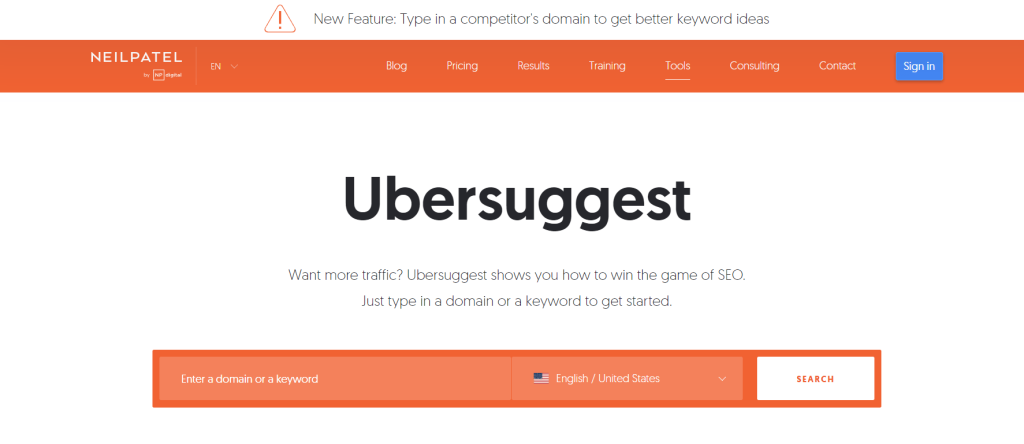
When it comes to Keyword research, this is the most recommended free tool for everyone.
This tool recently launched a paid plan. Ubersuggest has a geo-targeted pricing policy, so it changes based from location to location. It has plans for individuals as well as businesses. For an individual, it would start from the price of a hot dog of $14, and for a business, it would be as cheap as their per day stationery costs of $20.
For more pricing-related info, you can check out their pricing plan by clicking here. Ubersuggest paid plans are 90% cheaper compared to that of SEMrush, Ahrefs, and Moz.
2. Keyword Planner
Google’s keyword planner is another top tool for keyword research, you can do keyword research absolutely free with this tool. This tool is associated with Google, therefore they give more accurate keyword results compared to any other tool. You can do a lot of other SEO-related work as well with this tool.
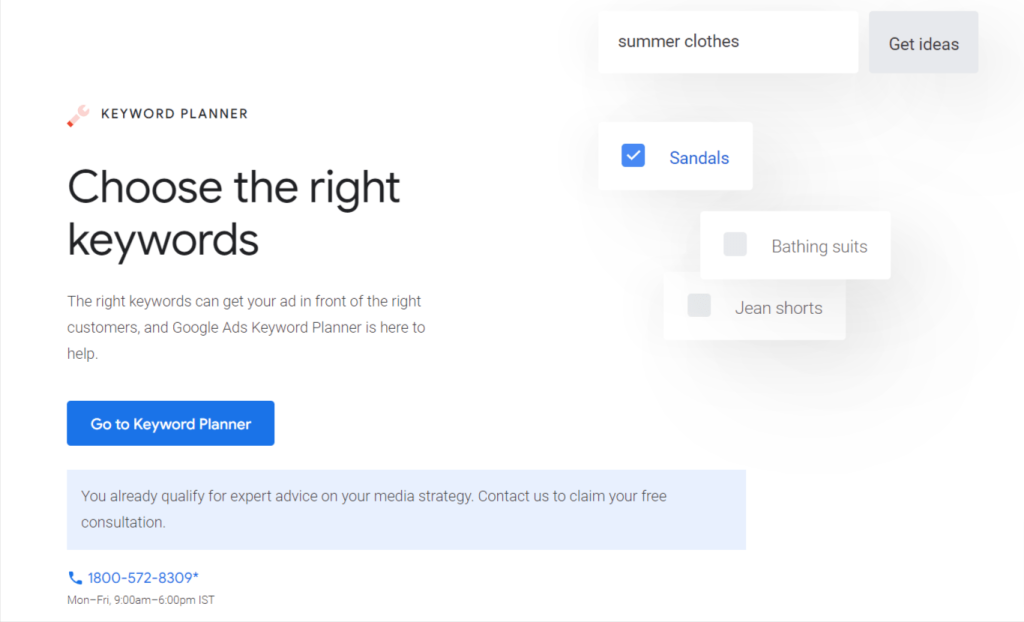
The keyword planner is extremely simple and it is a must-try for beginners who want to get started with SEO or keyword research.
3. QuestionDB
QuestionDB is the finest tool, where you need to type the broader topic and keyword and it will show you the list of questions people asked. There are many tools in the market that show the question-based keyword pulled out from Google or Bing. But QuestionDB scrapes all the questions from all over the Web including sites like Quora, Reddit, Stack Exchange, and many more which are the best gold mine of questions.
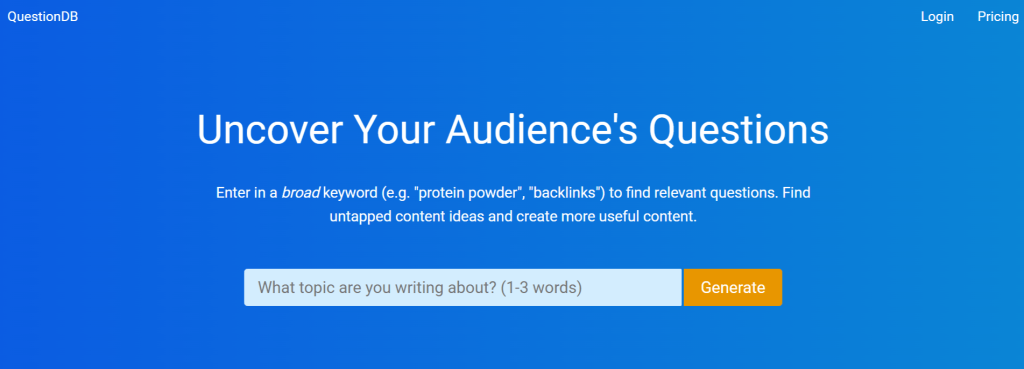
If you search for any topic QuestionDB will find a common question that people are asking that is related to the keyword research.
Related Read:
Conclusion:
We hope we could provide you with an ultimate guide to keyword research. Keep in mind to spend adequate time on keyword research and always look for a mix of head terms and long-tail keywords.
We feel pleased to walk you through our step-by-step process, and we believe that you have taken away the most from our blog. We are always open to your keyword-related queries, you can drop your doubts in our comment box, and we would be pleased to get back to you.
You can share your views, opinions, suggestions for improvements, and honest feedback with us as well in the comment box.